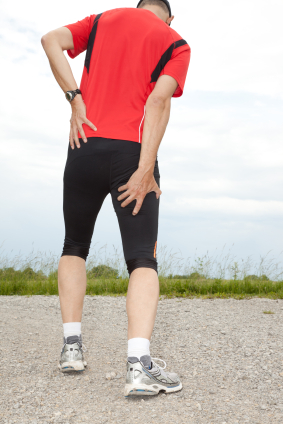- Incorrectly thinking you need to lose weight. Too often I see friends and trainees who claim they need to lose weight, yet they don’t understand that they’re already at a healthy weight. What they’re actually looking for is a specific size, not weight. Adding to the problem is that our society promotes “skinny” as “fit” through celebrities, magazines, and even health publications. Instead of striving for an unrealistic (and sometimes unhealthy) weight, start with a goal of a healthy waist measurement – typically below 35 inches for women and less than 40 inches for men. Then have your doctor or trainer assess your waist-to-hip ratio and body mass index to determine your health status.
- Excluding entire nutrient groups from your diet. Excluding carbs, proteins, or fats from your diet can lead to trouble. While it may lead to short-term weight loss (because you’ve effectively cut out a large portion of your calorie intake), this approach is typically not sustainable and will likely lead to even greater weight gain in the future. Look for a balanced approach to dieting, not extreme fads.
- Adopting a short-term approach. If you’re overweight or obese, you did not gain the extra weight overnight so you shouldn’t expect to lose it overnight either. Think in terms of lifestyle change, not quick results. Short-term goals are good, but they should be modest goals that don’t place your health at risk.
- Losing weight too fast. Is it possible to drop several pounds in a week? Yes. Is it healthy? Probably not. Is it ultimately effective? No. Most of the initial weight loss that occurs over a short period of time is largely water weight. These fluctuations can vary by several pounds and shouldn’t be used as an accurate assessment of progress toward a weight loss goal. A modest weight loss goal of 10% of your body weight over the course of six months is healthy, and it gives you the best chance of keeping excess weight off.
- Not knowing your calorie requirements or intake. Do you want to reduce your calorie intake? How much are you consuming now? What is a healthy recommendation for calorie intake based on your sex, weight, and activity level? Unfortunately, most people don’t know the answers to these questions. It’s important to know this information before you randomly reduce the amount of calories you consume. Check out the USDA’s Daily Food Plan Calculator to determine your required calorie intake.
- Not eating enough. Are you still stuck in the “I have to eat less to lose weight” mindset from the last decade? Newsflash – There are more calories in one Cinnabon (880 calories) than there are in 27 cups of chopped broccoli. Still think you need to eat less to lose weight? The truth is that you must create a negative calorie balance to lose weight. This can be done by taking in fewer calories (which doesn’t necessarily equate to eating less food) or by increasing calorie expenditure through exercise.
- Focusing on calories while ignoring nutrient requirements. So now you understand that it’s calories, not necessarily total food consumption that determines weight-loss progress…good job. But there is still another consideration. Let’s say all you ate throughout the day were those 27 cups of broccoli (about 875 calories). As healthy as this appears, you’re missing out on vital nutrients that are provided by protein, fat, and grain sources. Proper nutrient intake is just as important as calorie control.
- Skipping meals. Two things happen when you skip meals. First, your body enters an energy conservation mode. It thinks you’re not going to provide calories for energy so it retains fat, the biggest source of energy. Second, you’re more likely to overeat at your next meal due to increased hunger. Avoid long stretches (4 hours or more) without eating something. Providing your body with enough calories throughout the day keeps your metabolism roaring constantly. Despite popular belief, you must eat to lose weight…you just have to eat the right foods in proper amounts.
- Not drinking enough water. Water keeps you hydrated, can reduce hunger, and helps your organs work more efficiently. Need I say more? If you want to make a positive change in your diet through one simple step, drink more water throughout the day.
- Choosing a diet that isn’t realistic or sustainable. Whatever diet you choose must mesh with your personal preferences and lifestyle. Being realistic about diet choices is the first step in living a healthier lifestyle. Fad diets, extreme eating plans, and excessive workout routines are likely to fall by the wayside. Choose plans and programs that you’re comfortable with and that are sustainable.
 Nutrient Considerations for Active Vegetarians
Nutrient Considerations for Active Vegetarians